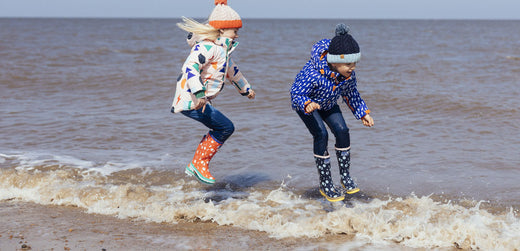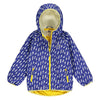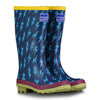
8 Top Tips to Live More Sustainably
At Muddy Puddles, we believe that living sustainably is both noble and achievable. In this blog article, we are delighted to share with you eight top tips to help you lead a more eco-friendly and conscious life. Our passion lies in protecting our planet for future generations, and we are excited to inspire you to join us on this journey. From simple everyday changes to adopting eco-friendly practices, we will guide you through practical steps to make a positive impact. Let's dive in together, embrace a greener lifestyle, and become part of the sustainable movement.
Here are our 8 top tips for living more sustainably every day.
1) Have a go at Meat Free Mondays
The meat industry is one of biggest challenges we face in reducing emissions and becoming more sustainable. The production of meat (particularly beef) requires large amounts of land, water and other resources, and cows emit significant amounts of methane as they digest grasses and plants. As a result, the climate impact of meat is roughly the same as all car and plane travel in the world. To incorporate sustainability into your diet in 2023, why not try going meatless one day a week? Meat Free Monday is a brilliant way to explore new plant-based recipes and eat a little bit healthier. If you’re up to the challenge, Veganuary is a brilliant way to try eating meat-free for one month and with so many brilliant recipes to try you might find it a lot easier than you think. When you do eat meat, try to look for organic, grass-fed or locally-raised options as these tend to be more environmentally friendly.
2) Reduce the amount single-use plastic you buy
We all know that single-use plastic has a huge environmental impact, and with over 90% of all single-use plastic going to landfill, there is a huge amount of microplastic contaminating our environment, polluting our water sources and even our food. Examples of single-use plastic that causes significant environmental damage includes plastic bread bags, plastic bottles, plastic coffee cup lids, plastic food packaging, crisp packets, cling film, balloons, and baby wipes. Consider making some small swaps to avoid single-use plastic – even one or two swaps can make a huge difference! Instead of buying bread in plastic bags, consider buying brands with paper packaging, instead of buying single-use bottles consider taking your own bottle with your or buying cans instead, instead of cling film try using beeswax wraps or reusable food storage bags, and instead of baby wipes which contain plastic try using biodegradable or reusable wipes.
3) Stop using chemical cleaning products
The majority of household cleaning products contain chemicals which are dangerous to consume and are harmful to the environment. The Environmental Protection Agency (EPA) categorises many of these chemicals as “volatile organic compounds,” including phosphorous (which constitutes about 30 to 40 percent of dishwasher detergents), nitrogen, and ammonia. When you use these chemicals in your home, they are rinsed down the drain and they head to water treatment facilities, however not all contaminants are removed and they can have a negative effect on wildlife. The next time you buy dishwasher tablets, washing detergent or home cleaning products, try to find an environmentally friendly option such as Ecover, Smol, Method, Neat or Homethings.

4) Buy groceries in bulk
A brilliant way to reduce your single-use plastic waste is to buy your groceries in bulk. There are incredible bulk zero waste food stores popping up all over the country, with over 200 physical stores and several online stores too. The brilliant thing about these stores are that there is no plastic packaging – you can buy pasta, rice, beans and pulses, nuts, cereals from dispensers and fill your own containers, or recyclable paper bags. Instead of buying plastic-wrapped store cupboard essentials at the supermarket, try visiting a bulk food store. If you don’t have one near you, then try to buy dried foods like pasta, rice, oats, and dried fruit in larger quantities to save money and reduce the amount of plastic packaging that you use.
5) Carry reusable shopping bags
Each year, 5 trillion single-use plastic bags are used worldwide – that’s 83 plastic bags a year for every person on the planet! Plastic bags have a huge environmental impact – carbon dioxide is released during the production process, and only 1% of plastic bags are recycled – the rest go to landfill, and eventually break down into microplastics, contaminating our waterways and oceans. Instead of buying plastic bags when you go shopping, make sure you keep a couple of reusable shopping bags in your bag, or your car so you don’t forget to take them with you. These are widely available, however we love Kind Bag, with their mini, medium and extra large reusable bags, which are made from plastic bottles.
6) Use your own water bottle / coffee mug
Every year 16 billion disposable coffee cups end up in landfill, which leads to 6.5 million trees being cut down, 4 billion gallons of water going to waste, and enough energy to power 54,000 homes for a year also going to waste. Carrying a reusable coffee cup is a no brainer, and will also save you money as a lot of coffee shops offer a discount if you bring your own cup/mug with you. We love Chilly's coffee cups, with their double walled design to keep hot drinks hot, and clever rotating lock mechanism to avoid spills. Similarly every year we use 7.7 billion single use plastic water bottles, so if we all carried a reusable one it would have a huge environmental impact.
7) Air dry your clothes
Using a tumble dryer emits more carbon in a single year than a tree can absorb in 50 years. By drying washing on a clothes airer, households can save 36kg of carbon from being released into the atmosphere each month. If you have a big family and find that you rely on your tumble dryer, try to reduce the amount that you use it, or only use it for bedding and towels. Try using a de-humidifier when drying clothes inside as this will speed up the drying process.
8) Try to use less water
A great way to reduce your carbon footprint is to avoid wasting water. Water is a more limited resource than you may think - less than 1% of the world's water supply is suitable for drinking. The treatment of water also uses a considerable amount of energy, and this energy currently comes from fossil fuels which have a huge impact on climate change. By making a few small changes we can help to make sure that there is enough water for communities around the world, for now and for future generations. Make sure that you don't let the tap run unnecessarily - teach little ones to turn it off while they're brushing their teeth or washing their hands. You could also encouarage them to take shorter showers, and avoid leaving the tap running when getting a glass of water. You could even consider collecting rainwater to use in your garden rather than using the hose.








